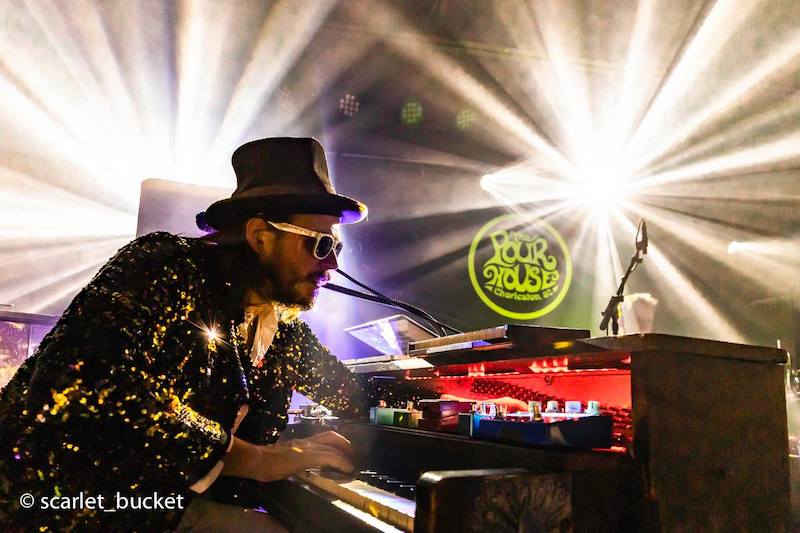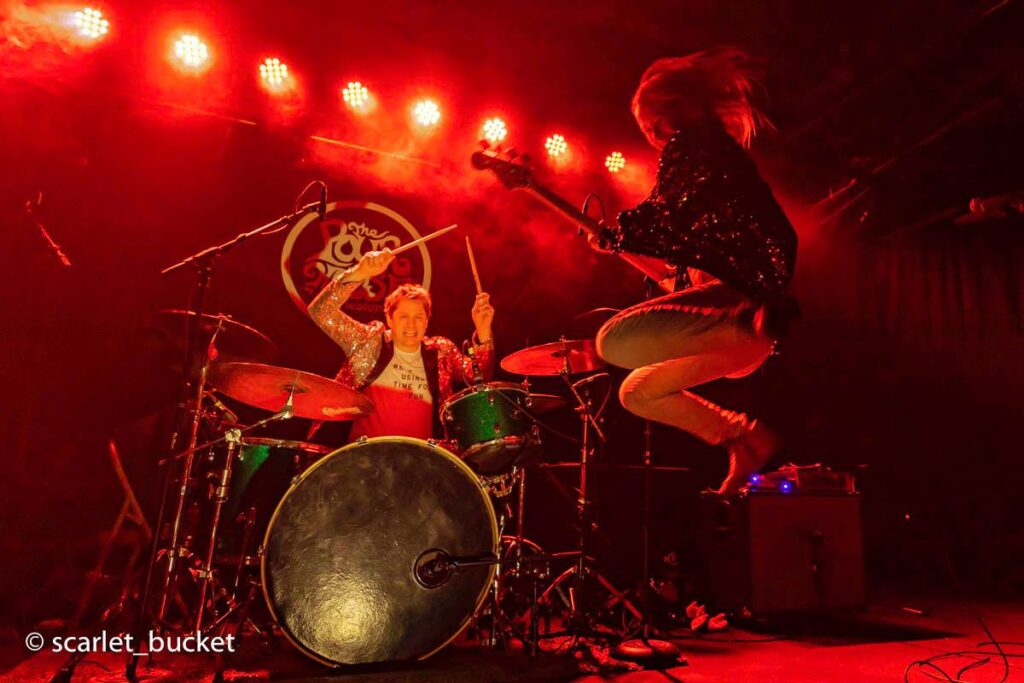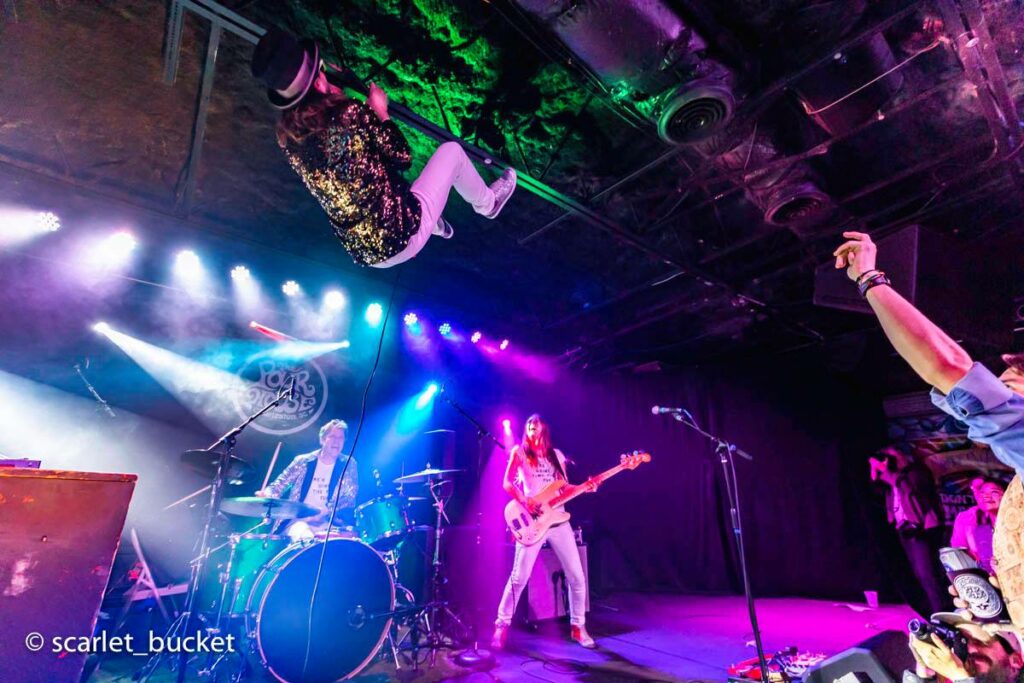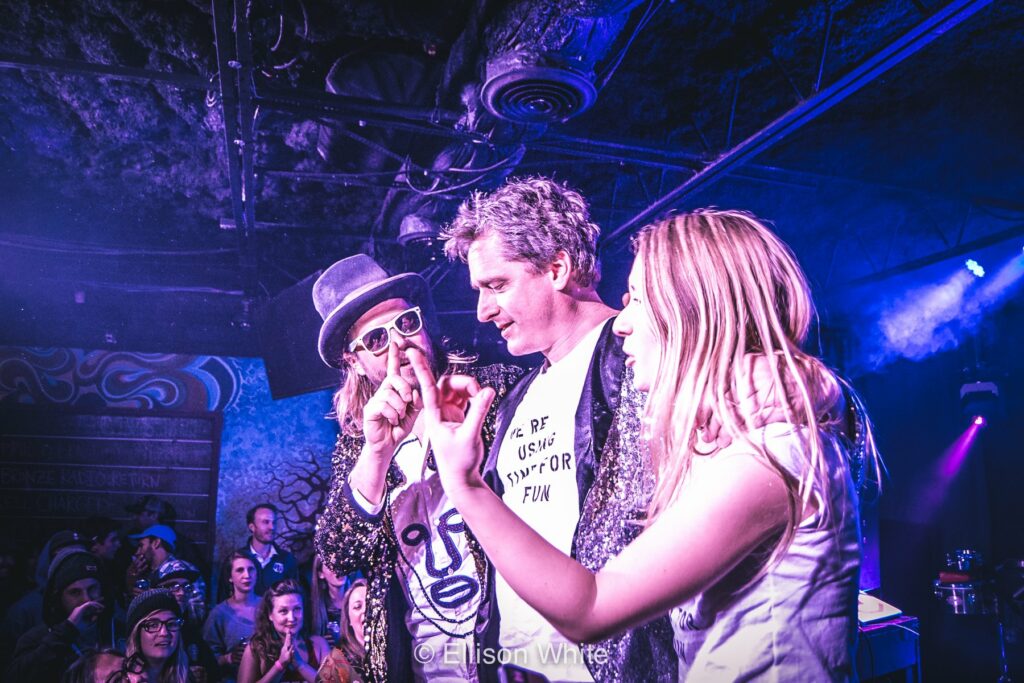Marco Benevento Talks Levon Helm, New Album ‘Let It Slide’, & More Before Charleston Pour House Stop

On the heels of releasing his 7th studio album, Let It Slide, pianist Marco Benevento is on tour promoting his new work. Benevento, best known as the keyboard player for Joe Russo’s Almost Dead makes a stop at The Charleston Pour House this Friday, January 24 with his trio made up of Karina Rykman (Bass) and Dave “DB” Butler (drums). Let it Slide is an incredible showcase of Benevento’s growing vocal prowess, songwriting, and creativity.
We had the chance to talk to Marco the day tour started about the new album, how it transitioned from studio to a live setting, Levon Helm, and a lot more. Check it out below.
Zach: Yeah, I’m going to talk to you a bit about that. Leon Michels, when The Black Keys got out in 2015 for whatever reason my Italian grandma from South Jersey loves the The Black Keys, but with Arabeck and the Arcs and stuff, I’ve stumbled onto his name and then when you guys made your album, I was wondering what made you guys link up?
Marco: I subbed for him in The Arcs, which was the band that Dan started after the Black Keys. I subbed for him for like the last three gigs of the tour in 2016 and that’s how I met him.
Z: I know Richard Swift was a good friend of yours. Did he give both of y’all good inspiration for the album, any themes?
M: He basically connected us, he was actually the one that recommended that I subbed for Leon to Dan. So when we were on the road, I was just telling Richard how I had all these new tunes, and I needed to make a record. He said, you should make it with Leon. You should hit him up. So I just hit him up and we just picked a couple of days to get together in the studio and make it happen. We finished the record and..
Z: You guys live near each other don’t you?
M: Yeah we live near each other in upstate New York, he lives in Rhinebeck and I live in Woodstock. Which is just not far at all. So we worked in Queens and we did a lot of over dubbage in our personal studios in our houses. We made the record and we sent it off to Richard Swift for him to mix but he was going through some hard times. Sadly he passed away, but the record possibly could have been done almost a year earlier. It was almost, it was crazy. But it was like a serious delay in the whole process.

Z: I think it came out at the right time.
M: Oh yeah, I agree. It was like one of those things where were like, “The record’s done, man, let’s just send it off to Richard Swift to mix it,” and we’re waiting to hear from him. We didn’t realize he was doing poorly. Leon and I just became super tight friends, our daughters are the same age. We hang out and have some dinners together. We would even like DJ little venues at Woodstock together. Hang out, play tennis together and stuff.
Z: How’s it up at Levon’s studio?
M: Levon’s is great, we are playing two nights there,
Z: I saw that, that’s so exciting.
M: Levon’s is crazy, that barn is like 2 miles from my house. Super close.
Z: Man, that’s awesome. You played there with Phil Lesh in the mid 2000s?
M: Yeah, Phil and Levon was there.
Z: How was that experience?
M: It was awesome. I think it was just the months that we were moving to Woodstock. We were just about to move to Woodstock and I got asked to sit in, it was like the best introduction to Woodstock. To play with Levon and Phil and Joe Russo. And just hang out in a church, of Levon’s, it’s like a whole vibe at that barn. It’s a very cool experience.
Z: Yeah, I’ve heard it’s quite the institution. If you and Leon didn’t work on the album together, do you think it would have come out a little bit different? What were his biggest themes he brought into it?
M: I write a lot of music and then use a drum machine a lot, and even live we have samples of drum machines that we play along to. Keeps things kind of like upbeat and dancy, like old drum machines, like Casio drum machines, retro shit. Leon was like, how married to the drum machine are you and I was like I’m not married to anything man, I want you to tell me what to do and he was like, “Alright cool.” I guess one of the biggest things is that he wanted to ditch a lot of the drum machine vibe and just play real in the studio and record it. And maybe make the drums sound like the drum machine, really effect the drums to the point where it almost sounds like a drum machine, you know human feels and everything like that. That was the big thing that he brought to the table. And then he had a lot of ideas for maybe some endings to some songs and chords, little extra things that could happen. He was also good at trimming the fat of some songs too. Like, “I don’t think you need this part, I don’t think you need these chords.”

Z: Yeah like trimming it down, since TigerFace, I feel like you’ve been on this mission of quality over quantity. Because you’re into like the indie prog rock, whatever you want to call it kind of scene. Who else gave you that sort of push and kind of fostered that?
M: I guess Rubblebucket, we used Kalmia Traver, we used her voice on TigerFace on two tunes. I was just kind of hooked, I want to do more. Yeah I was like, I want to do more music that has singing. And I almost hired Kalmia Traver, the singer from RB, to sing on our record. Swift, that we did with Richard, but I was like, I can’t keep hiring someone else to sing, like I just keep having to do it myself. So I just went for it, and basically our first vocal record was born out of TigerFace. It was cool to hear my tunes with vocals. I was imagining a girl voice too for those songs on TigerFace. I had a vision of that and then I was like I better just do it myself.
Z: Did you take lessons from anyone or you just rolled with it?
M: I just rolled with it, I used to sing a lot in high school in bands and choir and school and stuff. I’ve always sang, my dad sings and you know, when I got way into jazz and experimental music in college so I just sort of ditched that because I didn’t want to do that. I guess I’m just sort of drawn more towards the singing element these days. Almost like writing short, concise almost like pop songs.
Z: Yeah no we’re loving it. The experimental instrumentation thing, I know there were a few more like raw instruments in this album and I love the whole Gaffiano.
M: Nice, yeah that was a thing that Leon brought out in me too I guess.
Z: I was loving it. It kind of had this like Spidergawd, Japanese garden shit going on.
M: Yeah, it does almost sound like a Japanese instrument doesn’t it.
Z: What did you do to the piano? I noticed it sounded like the acoustics or the sonics were whatever.
M: Well, when we play live, I reach into the piano and mute the strings with the palm of my hand and that gives me about 6 or 7 notes range with just my hand, but in the studio I just put gas tape on the piano strings. And they were like, what do you call that? And I was like, I don’t know, gas tape on the piano, I don’t fucking know what it’s called. And they were like no, it’s called Gaffiano, Gaffiano. That’s what they called me for the rest of the session, it was pretty funny.
Z: Yeah that is hilarious. How was Japan?
M: It was great, we were definitely well received. We had a great show, great audience. You know we were there for a week and had one festival gig, so it was really chill.
Z: Wow, so you got to hang out a lot?
M: Yeah, we got to hang out in Tokyo, where the festival was which was like outside of Tokyo.
Z: Did you get out into the country at all?
M: Yeah, that’s where the festival was, it was pretty nice.
Z: I read a couple of places that you’re trying to set up Europe.
M: Yeah, we just got a European booking agent and he’s going to try to get us there during the Fall this year.
Z: Have you been there any at all?
M: I have yes, I actually did a study abroad in college, in Rotterdam, which is in Holland. Then I took a month and traveled around everywhere. Paris, Amsterdam, Rome, Slovenia, Prague. I just went everywhere, it was cool. We’ve played in the UK a few years back, and then even before that we played a festival in Italy. So we’ve been there a couple times but not that much. It would be cool to see some new towns, meet some new people and see what the reception is in another land.

Z: Yeah, so I guess two or three years ago, you guys were playing at Sweetwater 420 Fest in Atlanta and my friend had this kimchi business and you traded some Mama Yen’s for the Fred Short and we were listening to it after and like last week or a couple of days ago when we set this up, I noticed the lyrics you started making for this album are a little bit more personable. I don’t know if it’s because of the songwriting or what, are you referring to anything in particular. You say “you” a lot, you say “I” a lot.
M: No, not really. My wife helps me write a lot of the lyrics too. So she kinda gets in there and guides me a little bit. She is a bit more drawn towards lyrics than I am but she kind of gives me a hand which is nice.
Z: Nice. She’s not a musician is she?
M: She plays drums, guitar. Yeah, she used to be in an all girl band called, “The Ovulators” in Eugene, Oregon in the late 90s. But no, she loves music and live shows. I’ll bring her and our kids whenever I can, whenever it allows. Nothing personal, just trying to dial in the lyrics and just write something different.
Z: As far as transitioning everything from the studio with a couple different musicians and then having Karina and DB learn these songs that started in the studio. What’s the process of getting them really honed in on the songs?
M: I think while we were making it, they were all just psyched to hear it evolve. They were just like, “We can’t wait for this record to be done so we can learn all the parts.” Soon as the record was done, I sent it off it to them and they just learned every song. Then we got together like a week before our big tour and basically learned all the tunes and got them down. Really wasn’t that bad, wasn’t that hard of a process. Plus, we play so many shows a year, you kind of like tempering in the new songs here and there. Yeah so we were really prepared for the release tour this past Fall. We had like all the songs down basically.
Z: Since you’ve been writing more lyrics, I’m wondering if like opposed to when you’re writing an instrumental or playing an instrumental song, do you feel like you’re getting out what you want to get out with your lyrics just as much as your instrumentals.
M: I do like the instrumentals too, you know a lot of the lyric songs are two and a half, three and half minute songs and then once you get into the more instrume fntal songs, there a little bit longer and you know they kind of settled a bit and have a vibe. A whole mesmerizing quality about the instrumental tunes. So it’s kind of cool to have both worlds in this one band. One tour a while back I lost my voice because we were in Colorado and the air was so dry and I wasn’t really singing so much and I lost my voice and we had to play a show and I couldn’t sing but it was like seamless, nobody even cared because we have so many instrumental songs that we could put on a great show even if there is no singer, kind of cool.
Listen to Let It Slide below, and catch Marco Benevento at the Charleston Pour House this coming Friday, January 24th. Tickets here.